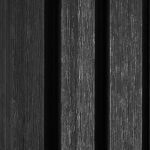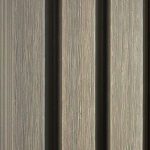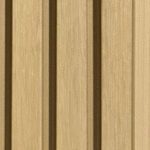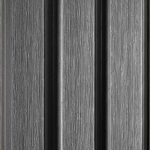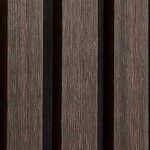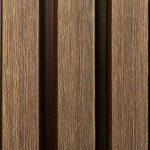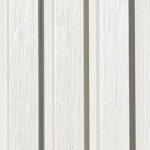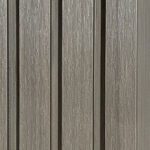Moisture resistance
Strength
Durability
Flexibility
Fire resistance
Lighter than solid wood or steel but just as durable, NORTwood wood composite products offer adequate structural support. Each panel has the beauty and strength of natural wood without degrading to the elements.
Our wood composite panels are eco-friendly alternatives to unsustainable traditional construction materials. Each one is made from a mixture of recycled strands, fibres, and wood waste that would otherwise fill landfills. The result is zero waste and a sustainable structure that reduces your carbon footprint.

NORTwood wood composite walls are durable, sustainable, and an excellent alternative to traditional wood wall panels. They offer the beauty of traditional wood without the expensive price tag.
Our wood composite products are not only sustainable, but they are also easy to clean and maintain. Unlike natural wood, these:
NORTwood wood composite panels have a sleek and clean look that can suit a range of décor options. Brighten up a dull room or achieve a timeless, rustic look. Available in a range of finishes and profiles that can satisfy custom requirements.
Our wood composite panels are made from a mix of wood fibres and ethically sourced recycled material. With their properties combined, we get a product that protects properties against harsh weather conditions keeping residents inside comfortable. Feel cool during the summer and toasty during the winter.
In an era marked by environmental consciousness and sustainable practices, the construction industry has witnessed a significant shift towards eco-friendly building materials. Among these materials, wood composites have emerged as a game-changer, offering a perfect blend of strength, sustainability, and versatility. In this article, we delve into the world of wood composites, exploring their properties, applications, and the numerous benefits they bring to the construction sector.
What is Wood Composite?
Wood composite, often referred to as engineered wood or composite wood, is a material crafted from wood fibers, particles, or veneers bonded together with adhesives or resins. Unlike solid wood, which is sourced directly from trees, wood composites are a composite of various wood components, making them an eco-friendly alternative with impressive structural qualities.
Properties of Wood Composite
Strength and Durability: Wood composites possess excellent structural integrity, making them ideal for a wide range of construction applications. They resist warping, cracking, and decay better than solid wood.
Sustainability: Utilizing wood fibers and particles from managed forests, wood composites reduce the demand for virgin timber, promoting sustainable forestry practices. This helps in preserving natural ecosystems.
Versatility: Wood composites come in various forms, such as particleboard, medium-density fiberboard (MDF), plywood, and oriented strand board (OSB). Each type offers unique attributes suited to specific applications.
Dimensional Stability: They have a consistent and predictable size, making them a reliable choice for applications where uniformity is essential.
Cost-Effective: Wood composites are often more affordable than solid wood, making them an economical choice for both residential and commercial construction.
Applications of Wood Composite
Cabinetry and Furniture: MDF and particleboard are popular choices for crafting cabinets, shelves, and furniture due to their smooth surface and ease of finishing.
Flooring: Engineered wood flooring, composed of wood veneer atop a plywood or composite base, provides the beauty of wood with enhanced durability.
Structural Components: Plywood and OSB are widely used in construction as sheathing, subflooring, and roof decking.
Exterior Cladding: Wood composites can be treated for outdoor use, making them suitable for siding and exterior trim, offering a wood-like appearance with better resistance to the elements.
Doors and Windows: Composite materials are used in manufacturing doors and window frames for their stability and resistance to warping.
Decking: Composite decking boards have gained popularity for their low maintenance, eco-friendliness, and resistance to rot and insects.
Benefits of Using Wood Composite
Sustainability: By using recycled wood fibers and reducing waste, wood composites contribute to environmental conservation and sustainable construction practices.
Strength and Durability: Wood composites offer a longer lifespan and better performance in various conditions compared to solid wood.
Cost-Efficiency: They provide a cost-effective alternative to solid wood without compromising on quality or aesthetics.
Design Versatility: With a consistent appearance and surface, wood composites are easy to work with, allowing for intricate designs and finishes.
Low Maintenance: Wood composites generally require less maintenance than solid wood, reducing long-term costs.
At NORTwood, we use eco-friendly and user-friendly installation methods to install wood composite cladding. Our unique system allows optimal air circulation between the substrate and siding. This ensures the entire structure remains dry and energy efficient.
Our wood composite panels are the substrate of choice for our clients. Each can be re-engineered to achieve specific performance characteristics and physical properties. Some of these include:
Moisture resistance
Strength
Durability
Flexibility
Fire resistance
